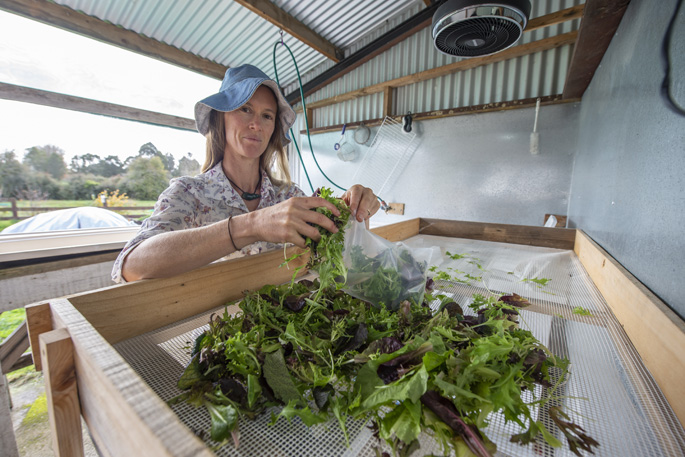Rotorua couple Jenny Lux and her husband Richard Gillies have fully embraced the organic life. They have gained organic certification on their 1.1ha of land on the outskirts of Ngongotaha, and are producing quality, organic vegetables for the local community.
Viennese-born Jenny moved to New Zealand when she was two. They lived for many years on her grandfather’s farm, where her mother, Juliet, was an avid home vege gardener. Jenny has always established a garden wherever she’s lived.
Jenny spent six years at university studying a double degree, then following the BSc in Science with a Masters in Environmental Science. For her thesis in plant ecology, Jenny spent time in the Waipoua Forest in Northland. She met her future husband, Richard, who was working for the Department of Conservation. They married and moved back to Rotorua to work as ecological consultants.
“When we had children I realised that my job and children didn’t mix, and I started looking for something else,” says Jenny.
Both of them loved the outdoors, and are passionate about the environment and sustainable living. “We are against chemical use and anti-pollution, and recognise that ecological, land and human health are all intertwined.
“Our decision to start an organic market garden was our response to the climate and environmental emergency this planet is in.”
Establishing the garden
They decided to use Jenny’s surname for the business Lux Organics. “It’s a little unusual so is easily remembered, and also means ‘light’, which is appropriate,” says Jenny.
After an 18-month search, they found a blank canvas of flat land with a northerly aspect, metered town water, and good volcanic ash and pumice soils, in Ngongotaha.
“Soil tests gave a favourable result. There was no contamination that would put a stop to the three-year organic certification process.”
Jenny started her management plan under OrganicFarmNZ. This not-for-profit organisation supports members in gaining their organic certification, providing a peer group for farms selling organic produce on the domestic market. Jenny is now certification manager for the Bay of Plenty regional group.
“Initially we introduced air by double digging the areas of pasture we wanted to turn into beds.”
The soil was built up with organic compost, and mineral deficits identified during soil testing were remedied using organically certified products. “Our aim is always to maintain a nutrient dense, living soil, with a good soil food web.”
Their soil was acidic and required calcium, potassium and phosphorus inputs. “Now established, we’re currently focusing on feeding the soil with liquid seaweed and liquid fish inputs.
“Crop rotation is also paramount, and having the knowledge about which plants take what from the soil, and which ones give back.”
Lux Organics gained organic certification in two years, which is achievable when the original soil
is uncontaminated, and the farmer has an exemplary record of inputs and management.
Meeting demand
Lux Organics grow all their produce from seed, using either organic seed or GE-free, untreated seed. They’ve experimented with different varieties and suppliers to find out what suits their soil. Seeds are started in greenhouses, then are transferred to the large polytunnel or in the long, neat beds outside.
“Networking with other small organic market gardeners is important and we’re all very open to sharing our experiences and ideas to support and encourage best practices in the industry,” says Jenny.
They currently grow 28 commercial crops, with different varieties of each crop grown too. Meeting demand is important while also keeping the selection “fun, delicious and interesting”.
Produce is sold at the Rotorua Farmers’ Market, Brown Owl Organics Co-op, and to several local food businesses. The family is mostly self-sufficient, and also invests income back into the business.
The plastic issue
Reducing their plastic use is a high priority. “Using plastic is completely the opposite of what we’re about.”
As organic farming depends on barrier methods as pest control, the couple meticulously reuse their netting and tarpaulins many times, while always searching for alternatives.
“I’ve been working with Convex in Hamilton to develop fully home compostable bags for our produce,” says Jenny.
After 17 months, the resulting EcoClear bag, which has a renewable, GE-free corn starch base, ticks all the boxes.
“The challenge now is to spread the word that there is a NZ- made product that effectively composts at home.”
Richard, Jenny and her mum Juliet all work in the garden, and children Simon, 11, and Ben, 9, are embracing their new lifestyle. “We love our organic lifestyle and we can make a living from it. “Organic is definitely the way to a sustainable future.”
To learn more about low-cost organic certification, see: www.organicfarm.org.nz



0 Comments
Leave a Comment